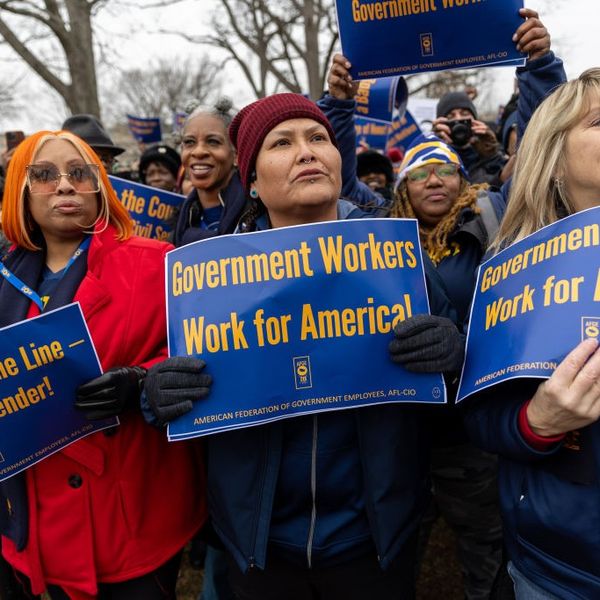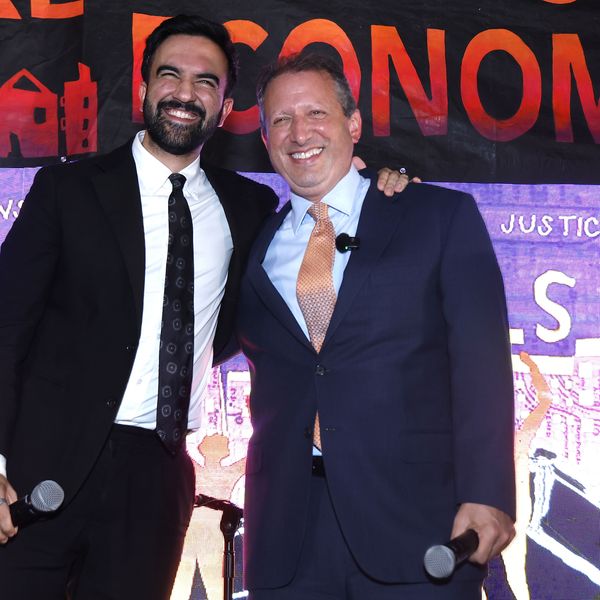With Sanders at the Helm, Lawmakers Lobby for Labor
'If we are serious about reducing income and wealth inequality, we have got to substantially increase the number of union jobs in this country.'
With organized labor increasingly under attack in the U.S., a handful of lawmakers is pushing to make it easier for workers to join unions, allowing them to pool their collective power to bargain for better wages, benefits, and working conditions.
Sen. Bernie Sanders (I-Vt.) and Rep. Mark Pocan (D-Wis.) on Tuesday unveiled new legislation, dubbed the Workplace Democracy Act, which would expedite the process for forming labor unions and penalize companies that delay negotiations.
"Millions of Americans who want to join unions are unable to do so because of the coercive and often illegal behavior of their employers," Sen. Sanders, who is running for the Democratic presidential nomination, said in a press statement. "The benefits of joining a union are clear: higher wages, better benefits and a more secure retirement."
He added, "If we are serious about reducing income and wealth inequality and rebuilding the middle class, we have got to substantially increase the number of union jobs in this country."
The legislation would allow the National Labor Relations Board to certify a union if a simple majority of eligible workers sign valid authorization cards. Under current law, 30 percent of employees must sign union cards to trigger an election, which is followed by another vote, during which the majority must voice favor for the union to get it certified.
"This legislation is simple common sense," writes AFL-CIO president Richard Trumka in a blog post Tuesday. "Its passage would provide the most significant opportunity yet for working people to rewrite the rules so that it's not just big corporate CEOs who dictate our economic futures."
Right to Work laws--which undercut unions by allowing workers to benefit from collective bargaining without having to pay dues--are already on the books in 25 states. Labor advocates fear that the upcoming U.S. Supreme Court decision in the case Friedrichs v. the California Teachers Association could be the death-knell for organized labor.
Sanders recently joined federal workers who were striking to win higher pay and union recognition for those who "cook and clean" for the nation's lawmakers.
During a press conference outside the Capitol on Tuesday, Sanders and Pocan were joined by workers who say they have faced retaliation for trying to organize their fellow workers. "Working moms shouldn't have to strike and face threats just to join a union," said Kellie Duckett, a federal contract worker at the U.S. Capitol. "We should be able sign up for the union just like we sign up for the PTA."
The bill is cosponsored in the Senate by Sens. Patrick Leahy (D-Vt.), Patty Murray (D-Wash.), Sherrod Brown (D-Ohio), Martin Heinrich (D-N.M.), Elizabeth Warren (D-Mass.), Kirsten Gillibrand (D-N.Y.), Debbie Stabenow (D-Mich.), Mazie Hirono (D-Hawaii), and Sheldon Whitehouse (D-R.I.).
Last month, Murray along with Rep. Robert Scott (D-VA) introduced the WAGE Act, which would crack down on employers who employ unfair labor practices to deter collective bargaining and allow workers to sue over allegations that they were fired for engaging in union organizing.
According to Bureau of Labor Statistics data released earlier this year, union workers' wages are 27 percent greater than for non-union workers. Further, a recent report by the AFL-CIO found that "more workers will be seeking raises through the collective bargaining process in 2015-2016 than at any other point in recent American labor history."
An Urgent Message From Our Co-Founder
Dear Common Dreams reader, The U.S. is on a fast track to authoritarianism like nothing I've ever seen. Meanwhile, corporate news outlets are utterly capitulating to Trump, twisting their coverage to avoid drawing his ire while lining up to stuff cash in his pockets. That's why I believe that Common Dreams is doing the best and most consequential reporting that we've ever done. Our small but mighty team is a progressive reporting powerhouse, covering the news every day that the corporate media never will. Our mission has always been simple: To inform. To inspire. And to ignite change for the common good. Now here's the key piece that I want all our readers to understand: None of this would be possible without your financial support. That's not just some fundraising cliche. It's the absolute and literal truth. We don't accept corporate advertising and never will. We don't have a paywall because we don't think people should be blocked from critical news based on their ability to pay. Everything we do is funded by the donations of readers like you. Will you donate now to help power the nonprofit, independent reporting of Common Dreams? Thank you for being a vital member of our community. Together, we can keep independent journalism alive when it’s needed most. - Craig Brown, Co-founder |
With organized labor increasingly under attack in the U.S., a handful of lawmakers is pushing to make it easier for workers to join unions, allowing them to pool their collective power to bargain for better wages, benefits, and working conditions.
Sen. Bernie Sanders (I-Vt.) and Rep. Mark Pocan (D-Wis.) on Tuesday unveiled new legislation, dubbed the Workplace Democracy Act, which would expedite the process for forming labor unions and penalize companies that delay negotiations.
"Millions of Americans who want to join unions are unable to do so because of the coercive and often illegal behavior of their employers," Sen. Sanders, who is running for the Democratic presidential nomination, said in a press statement. "The benefits of joining a union are clear: higher wages, better benefits and a more secure retirement."
He added, "If we are serious about reducing income and wealth inequality and rebuilding the middle class, we have got to substantially increase the number of union jobs in this country."
The legislation would allow the National Labor Relations Board to certify a union if a simple majority of eligible workers sign valid authorization cards. Under current law, 30 percent of employees must sign union cards to trigger an election, which is followed by another vote, during which the majority must voice favor for the union to get it certified.
"This legislation is simple common sense," writes AFL-CIO president Richard Trumka in a blog post Tuesday. "Its passage would provide the most significant opportunity yet for working people to rewrite the rules so that it's not just big corporate CEOs who dictate our economic futures."
Right to Work laws--which undercut unions by allowing workers to benefit from collective bargaining without having to pay dues--are already on the books in 25 states. Labor advocates fear that the upcoming U.S. Supreme Court decision in the case Friedrichs v. the California Teachers Association could be the death-knell for organized labor.
Sanders recently joined federal workers who were striking to win higher pay and union recognition for those who "cook and clean" for the nation's lawmakers.
During a press conference outside the Capitol on Tuesday, Sanders and Pocan were joined by workers who say they have faced retaliation for trying to organize their fellow workers. "Working moms shouldn't have to strike and face threats just to join a union," said Kellie Duckett, a federal contract worker at the U.S. Capitol. "We should be able sign up for the union just like we sign up for the PTA."
The bill is cosponsored in the Senate by Sens. Patrick Leahy (D-Vt.), Patty Murray (D-Wash.), Sherrod Brown (D-Ohio), Martin Heinrich (D-N.M.), Elizabeth Warren (D-Mass.), Kirsten Gillibrand (D-N.Y.), Debbie Stabenow (D-Mich.), Mazie Hirono (D-Hawaii), and Sheldon Whitehouse (D-R.I.).
Last month, Murray along with Rep. Robert Scott (D-VA) introduced the WAGE Act, which would crack down on employers who employ unfair labor practices to deter collective bargaining and allow workers to sue over allegations that they were fired for engaging in union organizing.
According to Bureau of Labor Statistics data released earlier this year, union workers' wages are 27 percent greater than for non-union workers. Further, a recent report by the AFL-CIO found that "more workers will be seeking raises through the collective bargaining process in 2015-2016 than at any other point in recent American labor history."
With organized labor increasingly under attack in the U.S., a handful of lawmakers is pushing to make it easier for workers to join unions, allowing them to pool their collective power to bargain for better wages, benefits, and working conditions.
Sen. Bernie Sanders (I-Vt.) and Rep. Mark Pocan (D-Wis.) on Tuesday unveiled new legislation, dubbed the Workplace Democracy Act, which would expedite the process for forming labor unions and penalize companies that delay negotiations.
"Millions of Americans who want to join unions are unable to do so because of the coercive and often illegal behavior of their employers," Sen. Sanders, who is running for the Democratic presidential nomination, said in a press statement. "The benefits of joining a union are clear: higher wages, better benefits and a more secure retirement."
He added, "If we are serious about reducing income and wealth inequality and rebuilding the middle class, we have got to substantially increase the number of union jobs in this country."
The legislation would allow the National Labor Relations Board to certify a union if a simple majority of eligible workers sign valid authorization cards. Under current law, 30 percent of employees must sign union cards to trigger an election, which is followed by another vote, during which the majority must voice favor for the union to get it certified.
"This legislation is simple common sense," writes AFL-CIO president Richard Trumka in a blog post Tuesday. "Its passage would provide the most significant opportunity yet for working people to rewrite the rules so that it's not just big corporate CEOs who dictate our economic futures."
Right to Work laws--which undercut unions by allowing workers to benefit from collective bargaining without having to pay dues--are already on the books in 25 states. Labor advocates fear that the upcoming U.S. Supreme Court decision in the case Friedrichs v. the California Teachers Association could be the death-knell for organized labor.
Sanders recently joined federal workers who were striking to win higher pay and union recognition for those who "cook and clean" for the nation's lawmakers.
During a press conference outside the Capitol on Tuesday, Sanders and Pocan were joined by workers who say they have faced retaliation for trying to organize their fellow workers. "Working moms shouldn't have to strike and face threats just to join a union," said Kellie Duckett, a federal contract worker at the U.S. Capitol. "We should be able sign up for the union just like we sign up for the PTA."
The bill is cosponsored in the Senate by Sens. Patrick Leahy (D-Vt.), Patty Murray (D-Wash.), Sherrod Brown (D-Ohio), Martin Heinrich (D-N.M.), Elizabeth Warren (D-Mass.), Kirsten Gillibrand (D-N.Y.), Debbie Stabenow (D-Mich.), Mazie Hirono (D-Hawaii), and Sheldon Whitehouse (D-R.I.).
Last month, Murray along with Rep. Robert Scott (D-VA) introduced the WAGE Act, which would crack down on employers who employ unfair labor practices to deter collective bargaining and allow workers to sue over allegations that they were fired for engaging in union organizing.
According to Bureau of Labor Statistics data released earlier this year, union workers' wages are 27 percent greater than for non-union workers. Further, a recent report by the AFL-CIO found that "more workers will be seeking raises through the collective bargaining process in 2015-2016 than at any other point in recent American labor history."

